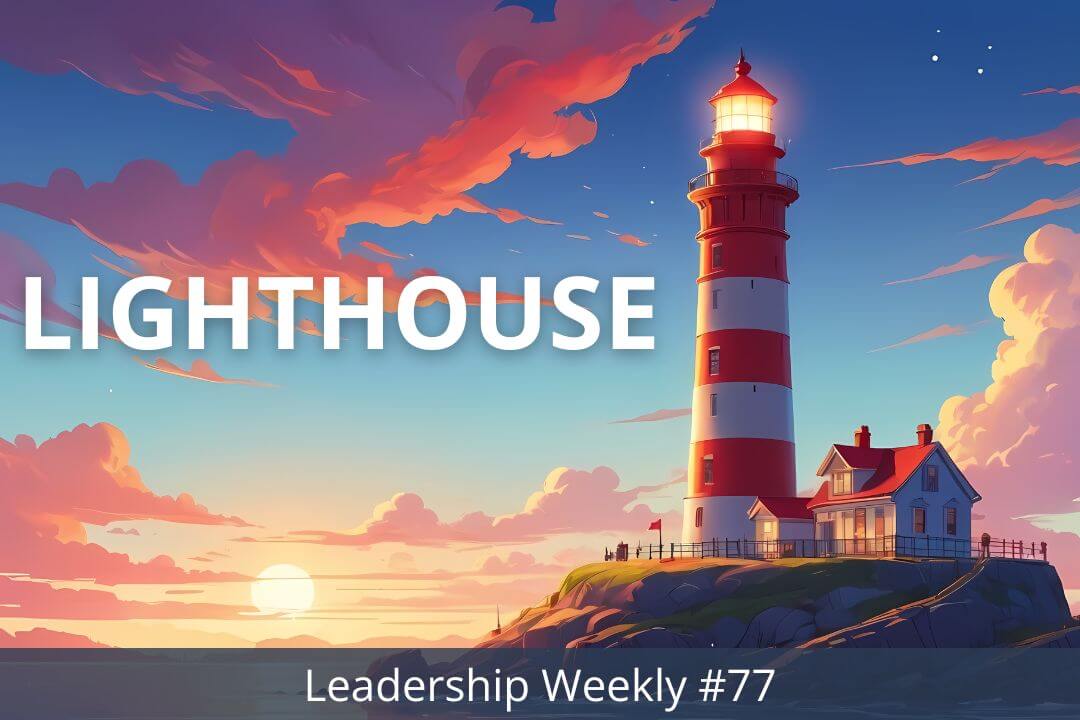Do you have a beginner's mindset? Are you willing to start to learn a new skill despite your comfort zone being in other areas?
The last couple weeks, I really challenged myself on that question, and it was as humbling and energizing as I expected.
You'll notice Lighthouse is very much driven by the written word, which is why we have a newsletter, blog posts, and email-based courses. But I wanted to try something new to see how it went, and in that case it was trying my hand at making some videos.
If you saw our messages on Wednesday and Friday you saw those efforts, which were quite the experience to produce and edit. It's quite the challenge and teaches you a lot about yourself in addition to the new thing you're trying and learning.
For example, it turns out the Friday video had quite a few awkward clicks/chirps after publishing it in Loom, which led me to re-recording it yesterday to improve it (though I still feel very much like a work in progress).
I'm going to keep experimenting with video in the future to get better at it, but we won't be adding it to our courses any time soon, because I can see that the written word is still our strength.
Have you challenged yourself lately to try something new, even if you might not be great at it yet? This reminds me to keep doing that.
In today’s edition, we cover another leadership lesson from Steve Jobs, a new workplace report from Atlassian, a big launch opportunity for you on Monday, and a new post on Bad Meetings.
Let’s dive in…
Table of contents:
- 🥘 Food for Thought on Jobs on Boldness, What's Possible, and Imposter Syndrome
- 📰 News & Reports for Managers on the State of Teams report by Atlassian
- 🔜 A Big Opportunity for Managers and Your Teams coming Monday (and Free things your may have missed).
➡️ Did a friend forward this to you? Get every issue straight to your inbox by signing up here.
Note: This is a preview of our weekly leadership newsletter, Lighthouse Leadership Weekly (LLW).
To get this sent to your inbox every week, along with our latest long form essays on this blog, you can sign up here.
🥘 Food for Thought
"Life can be much broader once you discover one simple fact: And that is everything around you that you call life was made up by people that were no smarter than you.
And you can change it, you can influence it, you can build your own things that other people can use.The minute that you understand that you can poke life...you can change it, you can mold it, That's maybe the most important thing.
...Shake off this erroneous notion that life is there, and you're just going to live in it. Versus embrace it, change it, improve it, make your mark upon it. ...Once you learn it, you'll want to change life and make it better...you'll never be the same again." - Steve Jobs, former cofounder and CEO of Apple
I came across this great, quick Tweetstorm from Jesse Pujji, a serial entrepreneur:
1/ “Remember everything around you was built by people no smarter than you”
— Jesse Pujji (@jspujji) June 14, 2024
I play my favorite Steve Jobs Video
I encourage them to apply this concept to the company. It may look fancy and formal but it was just created by their colleagues. They can shape it, they can change… pic.twitter.com/QhUnDOPTjf
This lesson from Jobs really does apply to everyone from startup founders and executives all the way down to interns: "everything around you that you call life was made up by people that were no smarter than you."
A caveat: Yes, there are geniuses, but that shouldn't stop you.
Before we dive into the main lesson today, I do want to address the obvious literal interpretation of this quote. Yes, there are geniuses. Woz was a genius at building and designing early computer chips for Apple, Einstein was a genius with how he developed the Theory of Relativity, and so were many others in history.
Yet, there's also a lot of people who have had tons of success changing the world that weren't particularly exceptionally gifted.
For instance, if you look at Steve Jobs, he became a titan of industry in his later years, and he was a world-class product designer, but early on he was far from a "genius". He worked incredibly hard to make Apple a success in the 70s and he developed a lot of his skills through hard earned experience and mistakes.
I believe Steve's message is to see that, because even in his case, his genius friend Woz needed a guy like Steve (and many other key team members) to make Woz's genius chip designs into a successful computer company.
The Antidote to Imposter Syndrome is Action
Imposter syndrome is a common problem talked about in Silicon Valley. With how companies break out often so quickly and the high concentration of smart, hard-working people, it's no surprise many people are intimidated by their peers, and the roles they can rapidly rise into.
Yet, Jesse used this Jobs clip specifically to remind his interns that they can have a bigger impact than they may realize.
And that's the most important thing to remind yourself when imposter syndrome hits: "everything around you that you call life was made up by people that were no smarter than you."
Even if you're feeling like a bit of an imposter as you do something, remember that others who came before you probably felt that way, too. And if they pushed ahead anyways, maybe you can be a bit more courageous in your moment of uncertainty, too.
Take intelligent risks
One of the best ways to leave your mark on a project, your team, your company, or your industry is to take smart risks.
Recognizing where you can make a unique contribution is as important as working hard once you've identified your target.
And the best part is, you probably already know.
Listen to that voice inside you.
No matter how loud the critics are in your head, there's always a quiet little voice that encourages you. That voice usually has an idea that you can't let go of. A suggestion of a better way to do things, or seeing an opportunity they know you should seize.
Early in my career, I had a motto, "Leave things better than you found them" and it really carried me quite far.
It turns out, most entry level employees make a mess. They make a lot of mistakes and jump around from project to project and task to task, often rushing thinking they're measured on speed above all else.
A little voice told me to instead focus on quality. And that led me to do all kinds of little things that people noticed and appreciated, while opening doors for me as my career progressed:
- When instructions were poor on a task, I'd make clean, easy to read ones after I figured it out.
- When I moved to new projects, I took the time to hand off cleanly and clearly to the next person
- When I started new tasks, I created a good wiki and note taking system so others, including my boss, could easily see both what I was doing and past work I'd done.
- When no one could help me figure something out, I was determined to find the answer myself and then share it.
- As I started learning more interesting things that my friends were also curious about, I started blogging to teach people. This opened many doors for me, including leading to the genesis to start Lighthouse.
I wouldn't be where am I today if I didn't listen to that voice that kept suggesting to me ways I could make small impacts. It turns out, those compound into big impacts.
Others notice what you're doing and give you more responsibility, emulate what you did, suggest it become a broader department policy, and help you find new opportunities.
Yet, none of what I did is Earth-shattering. I write this newsletter simply because I was eager to learn, listened to others, wasn't afraid of doing the research, and then have let it compound over a decade of doing so.
"Everything around you that you call life was made up by people that were no smarter than you."
What can you and your team do to make your mark on the world?
📰 News & Reports for Managers
📌 AI, and meetings, and productivity, oh my!
Atlassian, the makers of collaboration and team software like Jira, Trello, Loom, and Confluence, have released a "State of Teams" report. It's based on a survey of 5,000 knowledge workers and 100 Fortune 500 executives in the US, Australia, India, Germany, and France.
Here's a few of my favorite takeaways:
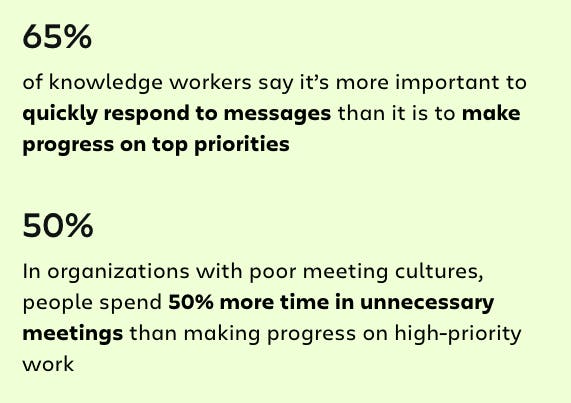
1) The wrong incentives are driving dysfunctional organizations
These stats on meetings and notifications are pretty alarming. Being incentivized to be responsive or sitting in meetings over getting work done are a recipe for workplace theater over real production.
If your company incentivizes that, it shouldn't be surprising if deadlines get missed, and goals don't get hit; it's not just that people get distracted from work, it's that people who thrive in that sort of environment are the kinds of people who don't want to do the work and aren't the most capable.
Having a culture of messages and meetings over getting things done can destroy a great team or company rapidly because of the shift in who thrives as well as how it hinders those trying to get things done.
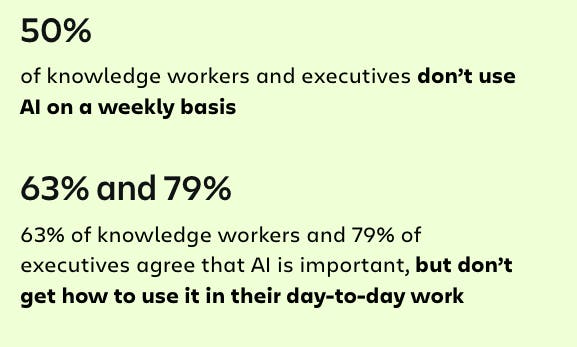
2) AI adoption is growing, but many still don't understand how to use it
It's interesting to see Atlassian's benchmark of how much AI is being used. Even though apparently 50% of workers use AI on at least a weekly basis, it appears a portion of them don't feel like they understand how to use it at work.
I suspect this means that they are using tools like ChatGPT to ask random questions, which means *technically* they're using AI, but not really consistently in workplace use cases.
Equally interesting is to look back at the Microsoft report from May which has slightly different numbers:
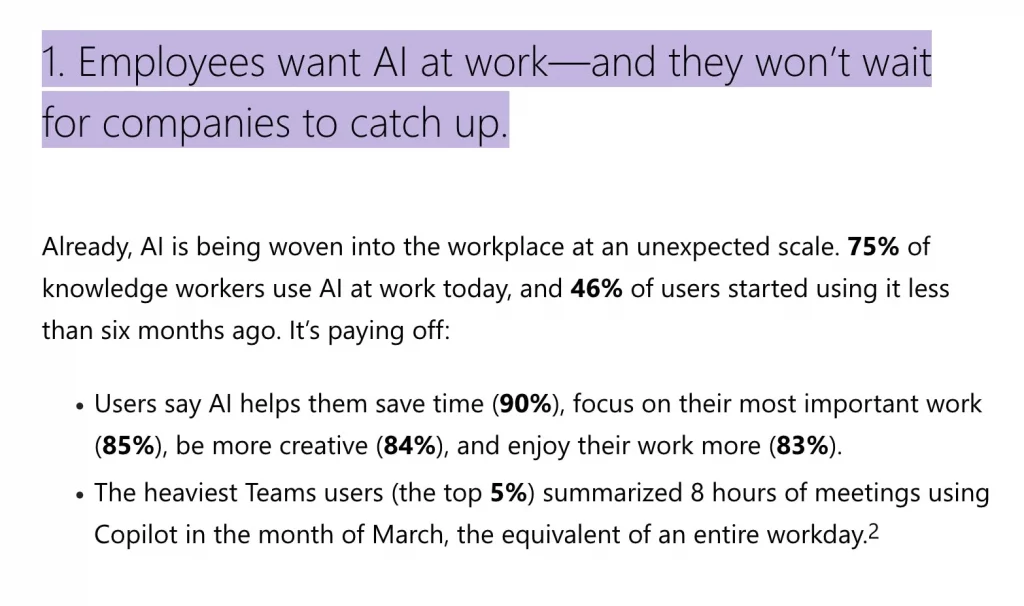
As you can see, Microsoft paints a much more optimistic picture both on adoption and understanding of the benefits of AI.
I suspect this difference is related to their difference in methodology which for Microsoft was, "surveying 31,000 people across 31 countries, identifying labor and hiring trends from LinkedIn, and analyzing trillions of Microsoft 365 productivity signals as well as research with Fortune 500 customers."
In this case, they're self-selecting people who probably were active on Linkedin to take their survey, and using people who use Microsoft products, which have AI features built in. The latter in particular can drive their AI adoption figures, because they'll know who at each Microsoft customer is and isn't using their AI features. And Microsoft can juice their numbers by default having those features turned on.
Regardless, if you triangulate the number between what Atlassian says and Microsoft contends, you can see we're reaching the tipping point where if you aren't using AI and don't understand it, you're in the minority.
If that's you, I'd encourage you to talk with your team this week to see how they're using it, and start trying things, because even Atlassian trumpets some pretty amazing benefits you could experience:
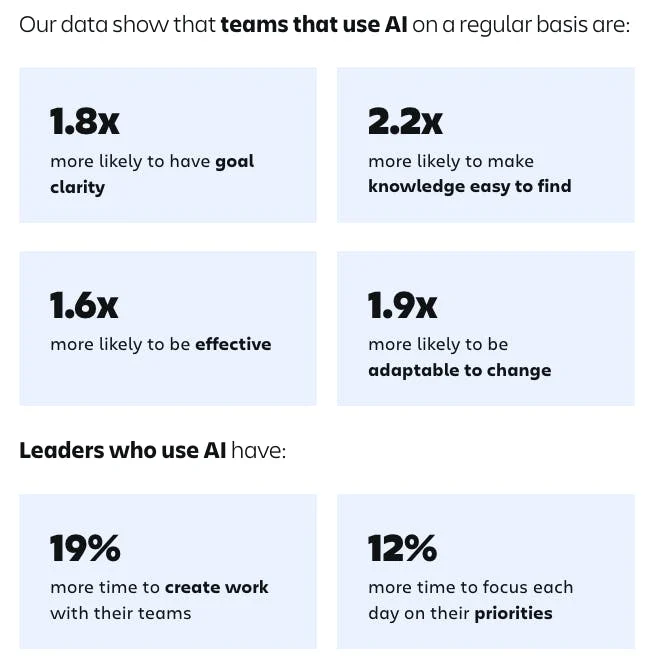
The good news is that the best way to learn with AI is typically trial and error. Go sign up for ChatGPT, Claude, or Perplexity, and start trying things. You may be surprised what it can do to help you.
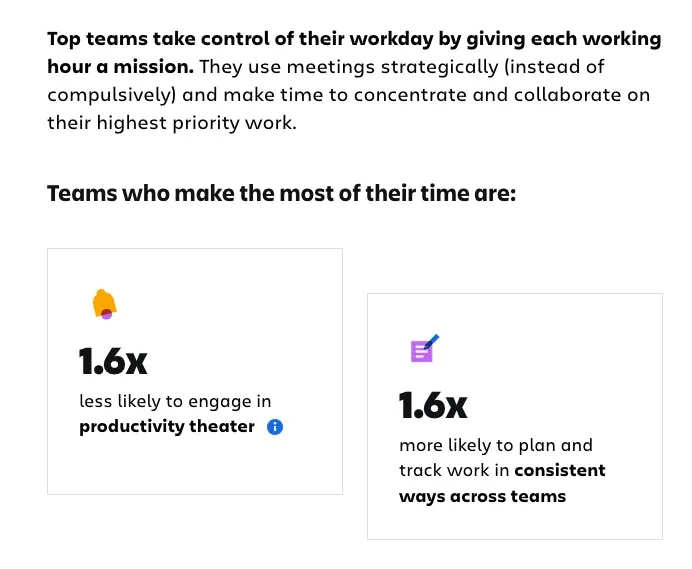
3) Time (management) is your greatest asset.
This stat is particular interesting, showing the contrast in the impact of different company cultures.
Teams that are judicious with their time and try to focus on their most important work get more done. Is it any surprise, the same culture would frown upon "productivity theater" and having unnecessary meetings?
This is exactly why the Book of the Month, "Tribal Leadership", is such an important read. It helps clearly lay out how culture is a system. Your culture becomes weaker or stronger depending on if the common and incentivized behaviors are raising up your culture, or making it worse.
You would think things like this would be obvious, yet they're able to report this contrast, because it's happening at companies every day:
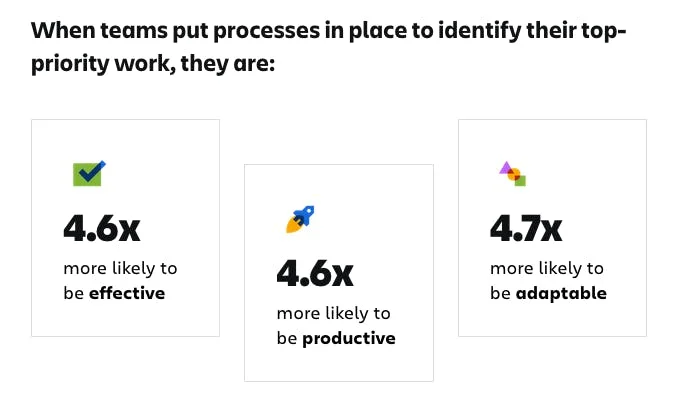
If you don't even know your top priorities, is it any surprise your employees would start playing other games of status and visibility instead?
Sometimes it really is about the fundamentals, and the Atlassian study shows us exactly that: Have clear communication and goals, reward getting the work done, and embrace new technology to help you, and you'll easily stand out from the crowd.
---
This week, it's worth checking on your workplace fundamentals:
- How much of you and your team's time are spent in wasteful meetings?
- Is your team actively trying AI tools to see if they can help you?
- Does everyone know the most important, top priority work they need to do?
If any of these aren't where you'd like them to be, use this study from Atlassian to remind you how much there is to gain by fixing or improving your answers to these.
🔜 A Big Opportunity for Managers + Your Teams coming Monday.
Over the past few months, we’ve been working on something truly special.
We've gathered research, surveyed and interviewed many of you, and poured our hearts into creating a program that will help you take control of your calendar, reduce your stress, and bring more balance to your work and personal life.
You may have seen some of our efforts on that front this week as we sent out insights on some of what we learned throughout the week:
- Monday: The Meeting Waste Scorecard to help you measure how much work you have to do to improve your meetings.
- Wednesday: The Top 5 Mistakes Managers Make When Trying to Improve Your Meetings, which shows you the pitfalls to avoid when you decide it's time to bring change.
- Friday: How to Bring Real Change to Your Meetings, which showed you the approaches that can help make your efforts to change your team's meeting culture a big success.
And now this coming week, we'll be launching our latest program to help you step by step make the meeting changes you've been thinking about.
If you've been dreaming of a world where you can be fully present when you're at home after work, and you don't have to open your laptop every night "to get real work done", or simply wish you controlled your calendar instead of it controlling you, you won't want to miss this.
This program will help you fix your meetings, reclaim the sanity of your schedule, and help your team get back to getting more real work done each week.
Stay Tuned for Monday!
Monday, we’ll be unveiling all the details. It's everything you've come to love from Lighthouse Lessons, plus some exciting new things we've developed just for this program.
Keep an eye on your inbox, and get ready to join us.
Sign up to get this newsletter & our latest blog posts straight to your inbox:
